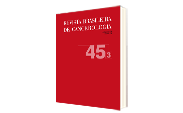Relapse Versus Cure: The Paradox of Surviving Childhood Câncer
DOI:
https://doi.org/10.32635/2176-9745.RBC.1999v45n3.2779Keywords:
Cancer, Survivors, Child, Quality of Life, CureAbstract
This research describes aspects of the survival experience. It focuses on the perceptions of the patients and their parents regarding the disease, its treatment and the psychosocial adaptation of the survivors. The study group consisted of ten children, aged six to twelve, and their parents. Interviews were administered separately to patients and their parents. Additionally, the children were given the Anxiety Line-State Inventory (IDATE-C) and the Child Depression Inventory (CDI). Analysis indicated that more than a half of the children returned to their daily activities, and have a good psychosocial adaptation, despite continuing parental anxiety concerning the risks of relapse or arousal of a new tumor. The psychometric scales revealed no significant evidence of anxiety and depression in the survivors. We conclude that surviving cancer implies living with the paradox of the “cured" status and the constant risk of relapse. The ways the survivor and his family cope with this doubt seem do determine the quality oftheir adaptation and reinsertion. Future studies are suggested in order to analyze the variables involved in the development of abilities to live with the paradox of cure.
Downloads
References
Paine, P.A.; Alves, E.; Tubino, P. - Adaptação psicológica de crianças com câncer. J Pediatr, 56: 409-413, 1984.
Faulkner, A.; Peace, G.; 0'Keeffe, C. - When a Child Has Câncer. London: Chapman & Hall, 1995.
Varni, J.W.; Katz, E.R.; Colegrove, R.; Dolgin, M. - Perceived social support and adjustment of children with newly diagnosed cancer. J Dev Behav Pediatr, 15: 20- 26, 1994. DOI: https://doi.org/10.1097/00004703-199402000-00004
Lozowski,S.L. - Views of childhood cancer survivors: selected perspectives. Cancer-supplement, 71: 3354-3357, 1993. DOI: https://doi.org/10.1002/1097-0142(19930515)71:10+<3354::AID-CNCR2820711737>3.0.CO;2-2
Alapetite, C.; Baillet, R; Champemond, S.; Dessard-Diana, B.; Housset, M; Michel-Langlet, P. - Opposition pour le malade cancéreux entre notion de guérison et surveillance prolongée. Psycho Médic, 20: 1283-1284, 1988.
Alby, N. - Difficulté pour les parentes dhntégrer la notion de guérison: conséqüences à long terme de la maladie sur les familles. Psycho Médic, 20: 1350- 1351, 1988.
Valle, E.R.M. - Algumas consequências psicossociais em crianças curadas de câncer - visão dos pais. J Pediatr, 70:21-27,1994.
Pretty, H. - La guérison du cancéreux selon le malade. Rapport introductif. Psycho Médic. 20: 1257, 1988.
Zucker, J.M.; Quintana, E.; Paquement, H.; Michon, J. - Câncer de Tenfant: guérison de la maladie ou guérison du malade? Psycho Médic, 20: 1347-1349, 1988.
Epelmam, C.L. - A verificação da compreensão da doença em pacientes pediátricos com câncer. Pediatri Mod, 26: 120-128, 1990.
Gimenes, M.G.G. - Definição, foco de estudo e intervenção. In: Carvalho, M.M.M.J. (Org.) Introdução à Psiconcologia. Campinas: Editorial Psy II, 35-56, 1994.
Brun, D. - A criança dada como morta: riscos psíquicos da cura. São Paulo: Psicólogo, 1996.
Pucheu, S. - Le sentiment de guérison et ses aléas psychiques. Psycho Médic, 20: 1279-1280, 1988.
Koocher, G.; 0’Malley, J.E.; Gogan, J.L.; Foster, D. - Psychological adjustment among pediatric câncer survivors. J Child Psychol Psychiatry,2: 163-173, 1980. DOI: https://doi.org/10.1111/j.1469-7610.1980.tb00028.x
Oppenheim, D. - Devenir psychologique des enfants guéris d'une affection cancéreuse. Neuropsych Enfance Adolesc, 44: 285-294, 1996.
Makipernaa, A. - Long-term quality of life and psychosocial coping after treatment solid tumours in childhood. Acta Paediatr Scand, 78: 728-735, 1989. DOI: https://doi.org/10.1111/j.1651-2227.1989.tb11134.x
Zelter, L.K. - Câncer in adolescents and young adults psychosocial aspects. Cancer-supplement, 71: 3462-3467, 1992.
Ganz, P.A. - Quality of life and patient with câncer. Cancer-supplement, 74: 1445-1452, 1994. DOI: https://doi.org/10.1002/1097-0142(19940815)74:4+<1445::AID-CNCR2820741608>3.0.CO;2-#
Cella, D.F. - Measuring quality of life in palliative care. Seminaries in oncology, 22: 73-81, 1995.
Costa Neto, S.B.; Araújo, T.C.C.F.; Curado, M.P. - O Coping como variável relevante na qualidade de vida de pessoas mutiladas. In: Kowalski, L.P.fOrg.) - Prevenção, diagnóstico e câncer bucal. São Paulo: Frôntis Editorial, 529-546, 1999a.
Costa Neto, S.B.; Araújo, T.C.C.F; Curado, M.P. - Avaliação da qualidade de vida de pessoas portadoras de câncer de cabeça e pescoço. Acta Oncol Bras., 1999b (no prelo).
Bayés, R. - Calidad de vida y câncer infantil. Jornadas Internationales de Atención Multidisciplinar al Nino com Câncer. Libro de ponencias y comunicaciones. Valencia: Federación de Asociaciones de padres de ninos oncológicos, 147-154, 1993.
Gouveia, V.V.; Barbosa, G.A.; Almeida, H.J.F; Gaião, A.A.- Inventário depressão infantil - CDI: estudo de adaptação com escolares de João Pessoa. J Bras Psiq, 44: 345-349, 1995.
Bardin, L. - Análise de conteúdo. Lisboa: Ed.70, 1977.
Araújo, T.C.C.F., Arrais, A.R. – A sobrevivência em oncologia: uma vivência paradoxal. Psi Ciên e Prof 18: 2-9, 1998. DOI: https://doi.org/10.1590/S1414-98931998000200002










